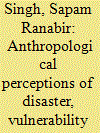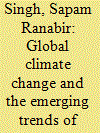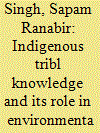| Srl | Item |
| 1 |
ID:
145392


|
|
|
| 2 |
ID:
145393


|
|
|
|
|
| Summary/Abstract |
A structured analysis of social inequalities related to hazards allows for a clarification and redefinition of the involved citizenship rights and their implications for the trust of citizens in public institutions. The concerned individuals, social groups and communities must participate in the knowledge production process about the territory and in the mapping of social vulnerability.
|
|
|
|
|
|
|
|
|
|
|
|
|
|
|
|
| 3 |
ID:
148017


|
|
|
|
|
| Summary/Abstract |
Disaster management agencies in India and in several other developing economies have not acknowledged the inbuilt factors of social vulnerability. There is a growing concurrence among researchers that detailed in-depth studies are required to assess social vulnerability.
|
|
|
|
|
|
|
|
|
|
|
|
|
|
|
|
| 4 |
ID:
154136


|
|
|
|
|
| Summary/Abstract |
Indigenous knowledge is the local knowledge that is unique to a culture or society. It is also known by other names such as: ‘local knowledge’, ‘folk knowledge’, ‘people knowledge’, ‘traditional wisdom’ or traditional science’. It is passed from generation to generation, usually by word of mouth and cultural rituals, and has been the basis for agriculture, food preparation, health care, education, conservation and the wide range of other activities that sustain societies in many parts of the world (UNESCO; 2010).
|
|
|
|
|
|
|
|
|
|
|
|
|
|
|
|